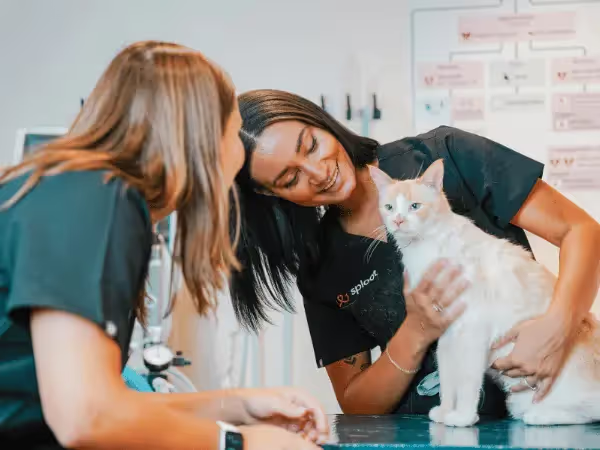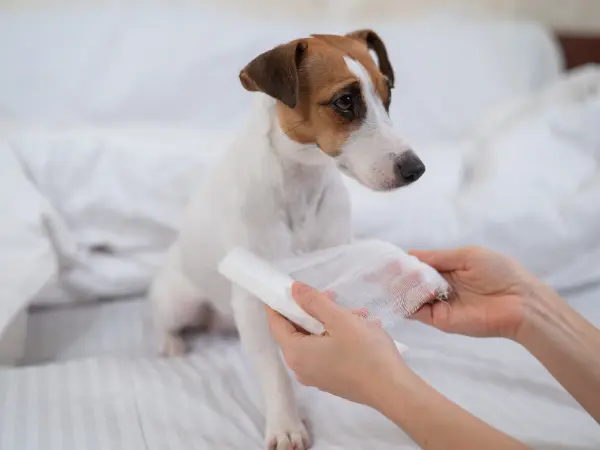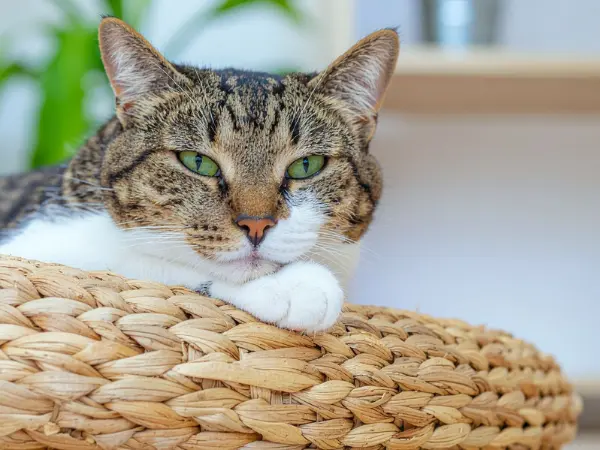Is your cat losing weight while still eating normally? Or perhaps you’ve noticed a decline in their appetite as well. In either scenario, seeing a cat’s weight dropping is concerning for any pet parent.
Weight loss can also be a sign of underlying health concerns or even stress. Because cats instinctively hide their discomfort, subtle changes in weight may be one of the earliest signs that something is wrong.
This Sploot Vets guide dives into the most common reasons cats lose weight and when to seek veterinary care.
Overview: Why is My Cat Losing Weight?
- Weight loss in cats can occur at any age, and there are a number of common potential causes.
- A cat could be losing weight due to dietary, nutritional, or metabolic reasons. In other cases, the cat may be in pain, suffering from an infection, or experiencing stress and anxiety, which are also possible reasons for sudden weight loss in cats.
- It is also common to notice a senior cat losing weight, which can be due to age-related changes in their body or chronic conditions.
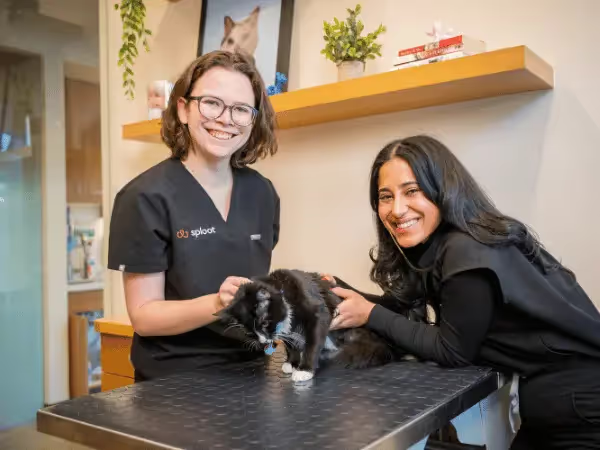
I. Why Is My Cat Losing Weight But Still Eating? [Diet, Metabolic, Lifestyle]
Cats can lose weight even when they appear to have a healthy appetite. This may be tied to lifestyle changes, underlying health conditions, or dietary issues. Here are some of the most common reasons a cat might be losing weight while still eating:
1. Increased Activity with New Toys or Activities
If you’ve recently introduced a cat treadmill, new toys, cat games, or even built a catio, your feline friend may simply be burning more calories than before. Extra playtime and enrichment can lead to gradual weight loss over time.
Do you need to see a vet?: Not necessarily, unless your cat’s weight loss is rapid or paired with other concerning symptoms like lethargy or hiding.
2. Metabolic Disorders in Cats
Two of the most common metabolic disorders that cause weight loss in cats are hyperthyroidism and diabetes mellitus.
- When a cat has hyperthyroidism, they have an overactive thyroid gland, which speeds up their metabolism, causing them to burn calories quickly despite eating well.
- Meanwhile, diabetes mellitus in cats means that the body cannot use glucose efficiently, so cats may eat more but still lose weight.
Do you need to see a vet?: Yes, especially if your cat shows symptoms such as excessive thirst, frequent urination, restlessness, vomiting, or poor coat condition.
3. Unbalanced or Poor Nutrition
Sometimes weight loss happens because a cat’s diet isn’t meeting their nutritional needs. Low-quality cat food, feeding the wrong life-stage diet (kitten vs. adult vs. senior), or improperly balanced homemade diets can all result in nutrient deficiencies and gradual weight loss in cats.
Do you need to see a vet?: Yes, a vet can help assess your cat’s diet and recommend balanced nutrition tailored to their age and health.
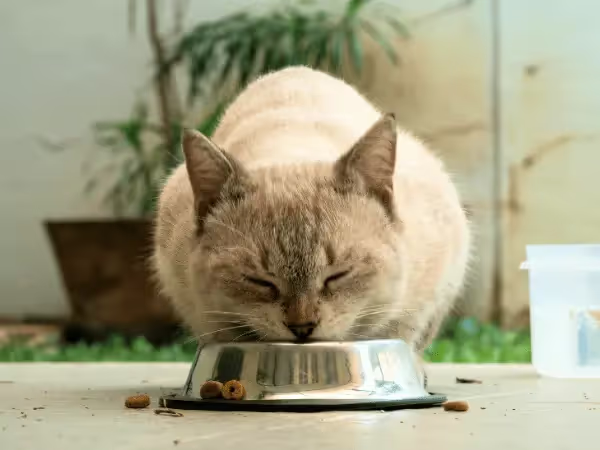
II. Why Did My Cat Suddenly Get Thinner? [Illnesses & Food Aversion]
If your cat seems to have gotten thinner overnight, it’s important to look beyond dietary or metabolic factors. Sudden weight loss in cats is often linked to behavioral issues, health issues, digestive problems, or even emotional stressors. Here are some possible reasons:
1. Picky Eating in Cats
Cats are known for their selective appetites or picky eating. Even if food is in the bowl, your cat may not actually be eating enough to maintain their weight. Factors like taste preferences, stale kibble, or stress can all affect their food intake.
Do you need to see a vet?: Yes, if picky eating is sudden or leads to ongoing weight loss, it would be best to consult a vet!
2. Cat Not Feeling Well
When cats are in pain or sick, they often hide, withdraw from human interaction, and may suddenly eat less. Even a short period of reduced food intake can lead to noticeable weight loss in cats.
Do you need to see a vet?: Yes, sudden appetite changes paired with weight loss almost always warrant a veterinary visit.
3. Constipation & Gastric Blockages in Cats
Cats are naturally prone to constipation partly due to their low thirst drive. If stool builds up or if hairballs block the intestines, eating may become uncomfortable. This can reduce appetite and quickly lead to weight loss.
Do you need to see a vet?: Yes, because untreated constipation or blockages can become veterinary emergencies if ignored.
4. Parasitic Issues & Infections in Cats
Intestinal parasites or worms in cats, such as roundworms, hookworms, or tapeworms, are common causes of weight loss, especially in kittens or outdoor cats. Other infections, such as bacterial or viral illnesses, can also interfere with nutrient absorption and appetite.
Do you need to see a vet?: Yes, only a vet can properly diagnose and prescribe safe parasite treatment or address infections in cats.
5. Inflammatory Bowel Disease in Cats
Feline Inflammatory Bowel Disease, or IBD, is one of the most common chronic gastrointestinal conditions in cats. It happens when the immune system causes inflammation in the digestive tract, making it harder for the body to absorb nutrients. This can lead to weight loss, vomiting, diarrhea, and decreased appetite.
Do you need to see a vet?: Yes, since long-term IBD can lead to malnutrition and discomfort. Diagnosis and treatment require prompt veterinary care.
6. Dental Issues in Cats [Tooth Pain, Tooth Resorption, & More]
Oral pain is an often-overlooked cause of weight loss in cats. Problems like tooth resorption, gingivitis, or broken teeth make eating painful, so cats may chew less, avoid food, or eat only soft foods. Over time, this results in weight loss despite food still being offered.
Do you need to see a vet?: Yes, because untreated dental problems in cats not only affect nutrition but can also cause infections that spread beyond the mouth. However, Sploot Medical Director Dr. Molly Wozniak reminds pet parents: “Many times, a cat’s loss of appetite and weight loss are attributed solely to their dental problems, but other health issues are often the main cause of weight loss. That’s why a full wellness exam is so important.”
7. Stress & Anxiety in Cats
Changes in environment, new pets, loud noises, or even shifts in routine cat care can cause stress and anxiety, which can suppress a cat’s appetite. This can then lead to sudden weight loss even in otherwise healthy cats.
Do you need to see a vet?: Yes, if stress-related weight loss persists. A trusted vet can help rule out medical causes and recommend strategies to ease your cat’s anxiety.
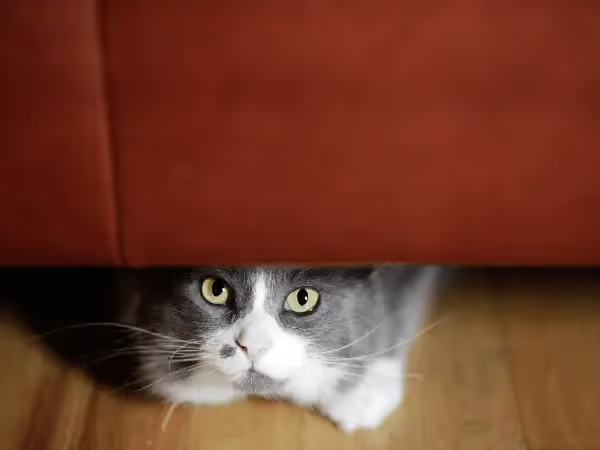
III. Why Is My Senior Cat Losing Weight Despite Eating?
As cats age, their bodies naturally go through changes that can affect weight. Even if your senior cat still has a good appetite, underlying age-related conditions may be causing weight loss. Here is a breakdown of the most common reasons:
1. Muscle Loss in Older Cats
Senior cats often experience muscle wasting (sarcopenia) as part of the aging process. Even when eating well, older cats may lose lean muscle mass, making them appear thinner or bonier over time.
Do you need to see a vet? Yes, if your older cat is losing weight, a vet can determine if the weight loss is a normal part of aging or linked to an underlying health concern. They can also recommend activities and dietary changes that can help your senior cat stay healthy and strong.
2. Age-Related Metabolic Changes in Older Cats
With age, a cat’s metabolism shifts. This can also be the reason why your elderly cat is losing weight. They may absorb nutrients less efficiently in their senior years, leading to gradual weight loss despite their usual food intake.
Do you need to see a vet?: Yes, routine checkups and bloodwork for senior cats help ensure metabolic changes aren’t masking other health conditions.
3. Chronic Illnesses in Senior Cats
Older cats can also lose weight due to chronic conditions that are common during a cat’s senior years. In such cases, weight loss could be just a symptom, alerting pet parents to a deeper health issue that needs attention.
Some of the most common chronic conditions that lead to weight loss in older cats include:
- Chronic kidney disease in cats – Often causes gradual weight and muscle loss, along with increased thirst and urination.
- Cancer in cats – Certain cancers can cause unexplained weight loss in older cats, even without obvious symptoms early on.
Do you need to see a vet?: Yes, unexplained weight loss in senior cats should always be evaluated, as early diagnosis improves treatment options and quality of life.
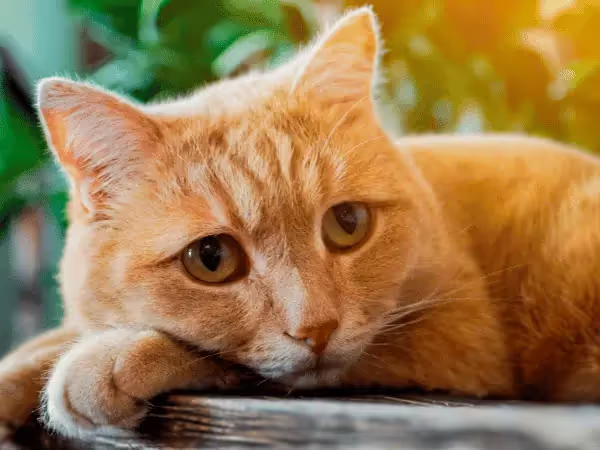
Final Thoughts on Cat Losing Weight
If your cat is losing weight but still eating, it’s important not to dismiss it. Causes range from increased activity and picky eating to chronic illness or stress in cats. The key takeaway: weight loss in cats, especially sudden or unexplained, deserves attention. Early veterinary care helps uncover the root cause and keeps your cat healthy and thriving.
Sploot Vets: Your All-in-One, Fear Free Cat Vet
At Sploot Vets, we provide top-tier, all-in-one veterinary care with a Fear Free approach, designed to make visits less stressful for kittens, senior cats, and anxious cats.
Whether you need preventive care, urgent care, or emergency vet services, our dedicated vet care team is here for you and your feline companion 365 days a year with extended clinic hours daily.
With locations in Denver, Chicago, and Colorado Springs, Sploot Vets is your trusted partner in keeping your cat happy, healthy, and thriving.
Book an appointment easily online or through the Sploot Vets app today!


